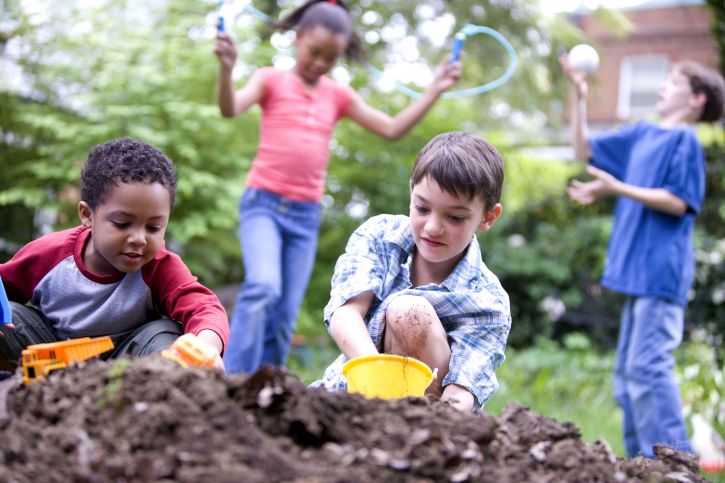
25 Mar, 2020 Free play! How to Make Your Kids Smart the Easy Way
by Trudi Griffin
First schools banished free play, and now parents stress themselves out to make sure kids’ days are scheduled to the max. The pressure is on for kids to become smarter, more agile, and as diversely talented as possible. But parents, what if you could do all that by stepping back?
Free play
For anyone who does not remember, free play is the technical term for when kids get together and do their own thing. They make up games, role play, build forts, all those things we used to do before technology infiltrated our lives.
Enter the educators and regulators who say that children need to acquire knowledge at the speed of light and at younger and younger ages. This means preschool teachers need lesson plans that meet educational standards. WHAT!?
As a survivor of preschool from the 1970s, there were no lesson plans. We played. A LOT.
But here’s the thing, cramming information in little heads does not make them smarter. It stresses them out and snuffs out the flames of curiosity, exploration, and creativity. These traits form the foundation of learning when they get older and without it, they become excellent memorizers and test-takers.
What free play really does
Most parents realize that children naturally play. But do you know how much goes on behind the scenes when they do? Educational research shows that kids who play grow exponentially faster than kids who do not academically, socially, and emotionally. They learn to take risks, problem-solve, explore, manage emotions, interact constructively with their peers.
Other research about the educational standards pushed on preschools shows that pushing too much on kids too early interferes with their academic potential. Here is a tidbit from the research. It comes from a huge study of Tennessee preschools, where preschoolers were taught reading and assessed for “kindergarten readiness.” The preschoolers indeed were ready for kindergarten and demonstrated good reading skills. That was the good news. However, by first grade, they didn’t like school so much. By second grade, their test scores in all subjects were worse than the preschools that did not force kids to read.
Parents stay out
Kids develop reading and math skills on a natural continuum. The best way to fuel those skills along naturally is to give kids a learning-rich environment, but let them be! When siblings or small groups of kids are playing, do not interfere. Let them hash out the rules, deal with problems, and figure out how to share. When parents stay out of kids’ playtime, they learn teamwork and the social-emotional skills so necessary to develop positive coping skills.
With the coronavirus keeping families cooped up together, the Internet is rife with suggestions on how parents can manage their kids’ time and keep them occupied with school. An even better gift would be to let your kids experience the joys of free play. No equipment or technology needed. No parental supervision or intervention needed (except for physical safety).
My mother told me in the 70s – “Go play.”
I whined back, “but I don’t know what to do.”
She said, “You’ll figure it out.”
Once I got over myself, I did. Not only did I have fun, but I think I turned out pretty darn smart.
So instead of burdening yourself and micromanaging your kids, make them smarter by telling them to
GO PLAY.
Trudi Griffin loves God, her husband, words, and learning. Before plunging into full-time research and writing, she practiced as a Licensed Professional Counselor providing therapy to people who struggled with addictions, mental health problems, and trauma in community health settings and private practice. Before that, she worked in the music industry for 13 years.
She is the content editor for Counter Culture Mom, producer for Hollywood Insider with Tina Marie Griffin, editor of Koinonia and practices writing for real on Medium.
Trudi loves spending time in the Word, with her husband who doubles as her BFF, reading, sewing, ham radio-ing, and gaming.
She is a firm believer that adults need time to play too.





No Comments